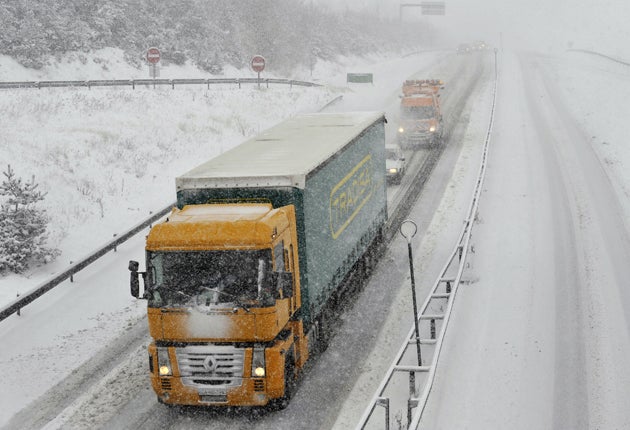Britain braces for weeks of transport chaos

Your support helps us to tell the story
From reproductive rights to climate change to Big Tech, The Independent is on the ground when the story is developing. Whether it's investigating the financials of Elon Musk's pro-Trump PAC or producing our latest documentary, 'The A Word', which shines a light on the American women fighting for reproductive rights, we know how important it is to parse out the facts from the messaging.
At such a critical moment in US history, we need reporters on the ground. Your donation allows us to keep sending journalists to speak to both sides of the story.
The Independent is trusted by Americans across the entire political spectrum. And unlike many other quality news outlets, we choose not to lock Americans out of our reporting and analysis with paywalls. We believe quality journalism should be available to everyone, paid for by those who can afford it.
Your support makes all the difference.Britain is gritting its teeth and its roads today in anticipation of the return of Arctic conditions, with heavy snow and ice storms likely to bring wide-scale disruption. With many parts of the country only just beginning to return to normal after weeks of sub-zero temperatures, the Met Office said up to 25cm of snow was expected to fall in parts of Scotland, North Wales, Northern Ireland and the West Country. Overnight temperatures were likely to plunge to -12C on high ground and to -5C in London over the weekend. Today, the mercury is unlikely to rise much above freezing point even in major cities.
Last night, snow showers were already reaching the outskirts of London, and some flights from Heathrow were delayed. Scotrail services to the Highlands were also hit. At Aberdeen airport, snow had been falling heavily from first light resulting in delays and cancellations throughout the day.
Network Rail said its fleet of 21 anti-icing vehicles was once again on standby while passenger groups demanded there be no re-run of the chaotic scenes two weeks ago when trains in the South-east were halted by frozen rails.
Anthony Smith, chief executive of Passenger Focus, said: "We hope that lessons have been learnt from the recent snow disruption and the industry delivers on promises that information and services to passengers will improve. Passengers understand about disruption during poor weather, but they won't forgive inaccurate or poor information from train companies."
Road users were warned of "uniquely difficult" conditions brought about by freezing air moving southwards in the wake of a band of rain. The Local Government Association said councils were unable to grit in the short time between the rain stopping and the freeze setting in, resulting in dangerous black ice on main routes.
The warning came as the Highways Agency said it was acquiring 250,000 tons of salt. But the AA said this could prove of little benefit to motorists this weekend, when roads will busier than usual as schools break up and the great Christmas getaway begins. There has already been a 23 per cent jump in car insurance claims, according to the organisation, which advises drivers to plan for the worst and pack warm clothing even on the shortest of journeys.
Winter's early onset and December's unprecedented snowfall has already cost the economy an estimated £4.8bn, with predictions that the total cost for the year could be many times greater. David Greaves, director of the insurance company RSA, said: "The latest bad weather couldn't come at a worse time for some businesses. The impact will be felt across the whole economy."
A backlog of 4 million undelivered parcels in the depots of private carriers led to claims that in parts of Scotland and the North-east Christmas presents might be delayed. Simon Veale, director of Global Freight Solutions, described the situation as like "bailing water out of a sinking ship". The Royal Mail said it was experiencing the worst December conditions for 30 years.
The latest round of freezing weather was bad news for the elderly and vulnerable and for the National Health Service, which is already under pressure following the return of swine flu. Thames Water, meanwhile, reported a 400 per cent rise in the number of burst pipes compared to last year.
Join our commenting forum
Join thought-provoking conversations, follow other Independent readers and see their replies
Comments